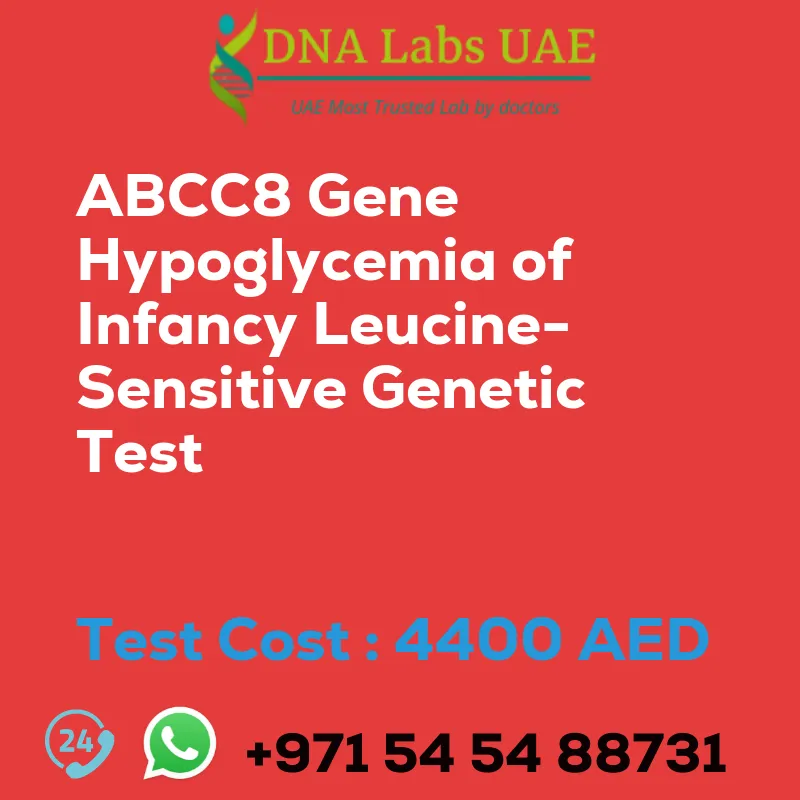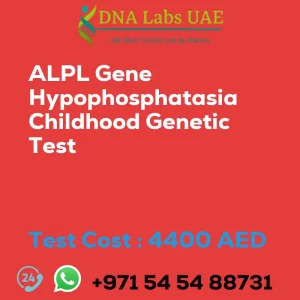ABCC8 Gene Hypoglycemia of Infancy Leucine-Sensitive Genetic Test
Components: ABCC8 Gene Hypoglycemia of infancy leucine-sensitive Genetic Test
Price: 4400.0 AED
Sample Condition: Blood
Report Delivery: 3 to 4 Weeks
Method: NGS Technology
Test Type: Metabolic Disorders
Doctor: General Physician
Test Department: Genetics
Pre Test Information: Clinical History of Patient who is going for ABCC8 Gene Hypoglycemia of infancy, leucine-sensitive NGS Genetic DNA Test. A Genetic Counselling session to draw a pedigree chart of family members affected with Hypoglycemia of infancy, leucine-sensitive.
Test Details:
The ABCC8 gene is responsible for encoding a protein called the sulfonylurea receptor 1 (SUR1). This protein is found in the beta cells of the pancreas and plays a crucial role in regulating insulin secretion.
Hypoglycemia of infancy, leucine-sensitive (HI/LS) is a rare genetic disorder characterized by severe hypoglycemia (low blood sugar) in infants. This condition is caused by mutations in the ABCC8 gene, leading to abnormal functioning of the SUR1 protein. The leucine sensitivity in HI/LS refers to the fact that the condition is triggered by the intake of leucine, an essential amino acid found in many foods. When an affected individual consumes leucine, it further exacerbates the hypoglycemia.
NGS (Next-Generation Sequencing) genetic testing is a method used to analyze multiple genes simultaneously, allowing for the identification of genetic variations or mutations that may be responsible for a particular condition. In the case of HI/LS, NGS genetic testing can help identify mutations in the ABCC8 gene, confirming the diagnosis of this disorder.
By detecting the specific mutations in the ABCC8 gene, NGS genetic testing can aid in the accurate diagnosis of HI/LS, allowing for appropriate management and treatment strategies to be implemented. This may include dietary modifications, medication, and close monitoring of blood sugar levels to prevent hypoglycemic episodes and associated complications.
| Test Name | ABCC8 Gene Hypoglycemia of infancy leucine-sensitive Genetic Test |
|---|---|
| Components | |
| Price | 4400.0 AED |
| Sample Condition | Blood |
| Report Delivery | 3 to 4 Weeks |
| Method | NGS Technology |
| Test type | Metabolic Disorders |
| Doctor | General Physician |
| Test Department: | Genetics |
| Pre Test Information | Clinical History of Patient who is going for ABCC8 Gene Hypoglycemia of infancy, leucine-sensitive NGS Genetic DNA Test A Genetic Counselling session to draw a pedigree chart of family members affected with Hypoglycemia of infancy, leucine-sensitive |
| Test Details |
The ABCC8 gene is responsible for encoding a protein called the sulfonylurea receptor 1 (SUR1). This protein is found in the beta cells of the pancreas and plays a crucial role in regulating insulin secretion. Hypoglycemia of infancy, leucine-sensitive (HI/LS) is a rare genetic disorder characterized by severe hypoglycemia (low blood sugar) in infants. This condition is caused by mutations in the ABCC8 gene, leading to abnormal functioning of the SUR1 protein. The leucine sensitivity in HI/LS refers to the fact that the condition is triggered by the intake of leucine, an essential amino acid found in many foods. When an affected individual consumes leucine, it further exacerbates the hypoglycemia. NGS (Next-Generation Sequencing) genetic testing is a method used to analyze multiple genes simultaneously, allowing for the identification of genetic variations or mutations that may be responsible for a particular condition. In the case of HI/LS, NGS genetic testing can help identify mutations in the ABCC8 gene, confirming the diagnosis of this disorder. By detecting the specific mutations in the ABCC8 gene, NGS genetic testing can aid in the accurate diagnosis of HI/LS, allowing for appropriate management and treatment strategies to be implemented. This may include dietary modifications, medication, and close monitoring of blood sugar levels to prevent hypoglycemic episodes and associated complications. |








